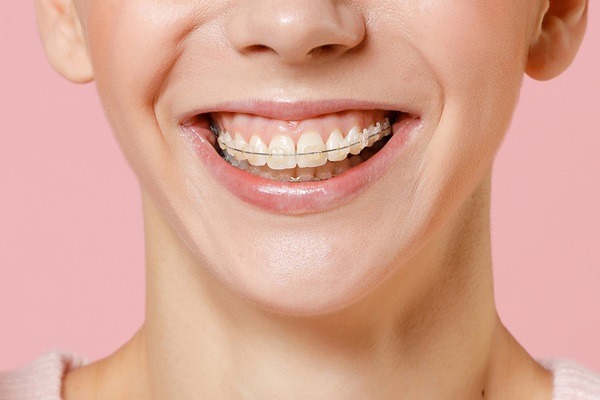
TMJ DentistLubbock, TX
If you continue to experience pain in the jaw that limits your quality of life, we can help relieve the pain and related symptoms as a TMJ dentist. Standing for a temporomandibular joint disorder, TMD is a condition that affects the joints in the jaw, causing pain, soreness, difficulty eating, challenges when speaking, headaches, and more.
TMJ treatment is available at BlueSky Orthodontics in Lubbock and the surrounding area. There is no reason to let the condition get worse without treatment. Since each patient’s condition is unique, we will customize the treatment to each patient’s individual needs.
Call us today and schedule an appointment to receive the lasting pain relief you need with our TMJ treatment.
Causes of TMD
TMD refers to the dysfunction of the temporomandibular joint and associated muscles. There are numerous causes of TMJ disorder, and the exact one can be challenging to determine. Chronic stress can produce tension in the area, and people who grind or clench their teeth may develop problems within the jaw joint.
Other causes may include external sources, health conditions, and personal habits:
- Arthritis
- Poor posture
- Excessive gum chewing
- Misalignment of the jaw
- Injury to the jaw
Often, TMD results from a combination of factors. Recurrent muscle issues can lead to a cycle of pain because they affect the joints. These, in turn, cause tissue damage, muscle spasm, and muscle tenderness.
There are numerous causes of TMJ, and the exact one can be challenging to determine.
Symptoms of TMJ Disorder
A common sign of TMD is localized pain in the jaw joint. However, since the joint is in front of the ear, associated symptoms include pain in the ear, forehead, face, or eye. Another common indication is frequent clicking of the jaw.
People with TMJ disorders typically have headaches due to tension. TMD can also affect certain functions such as moving the mouth and seeing. Thus, some people may have symptoms such as difficulty chewing or blurry vision. On rare occasions, symptoms associated with the TMJ may include vertigo or dizziness.
Treatment of TMJ Disorders
A TMJ dentist takes a conservative approach to treatment in the beginning. A bite guard or stabilization splint is a common treatment approach. If the problem seems to be caused by bite issues, an orthodontist may recommend bridgework, braces, or an occlusal adjustment. For patients in which conservative remedies do not bring results, other treatments, such as surgery or implants, may be recommended.
…10 million people may suffer from TMJ disorders
Frequently Asked Questions
Disorders associated with TMJ can be confusing, and it is common to have questions. Our office is happy to answer any questions you may have. Here are common questions we hear about TMJ disorders and our answers to them.
What Are Some signs I have TMD?
Localized signs of TMJ include difficulty opening the mouth, sore jaw muscles, sensitive teeth, discomfort when biting, and a popping jaw. Other symptoms may include ear pressure, headaches, face swelling, chronic sinus infections, and tinnitus. People with TMJ also tend to notice chronic pain of the neck and shoulders.
Who provides treatment for TMJ disorders?
TMJ can be complicated, so make an appointment with the right professional. Not all dentists treat disorders of the jaw, so it is essential to search for a TMJ dentist. Our team has the tools and experience to diagnose the problem and recommend the proper treatment for each individual.
How is TMD diagnosed?
Dr. Derid S. Ure, DDS, MSD takes a multiple-step approach to diagnose TMD. We may make a model of the teeth to help determine the bite and gain other information. There is a dental examination, as well as an evaluation of the jaw joint and related muscles. We may take X-rays, as well.
What are the other effects of TMD?
TMJ disorders affect more than just the jaw and surrounding area. When there is dysfunction in the area, the muscles spasm, and over time this leads to chronic tension in the neck, shoulders, and upper back. TMJ also affects sleep, and this can contribute to additional health problems such as obesity, high blood pressure, cardiovascular disease, and stroke.
How long does TMD treatment take?
Treatment methods vary, and each situation is unique. However, some people notice pain relief within 48 hours after the initial treatment. Other patients may notice results in a few weeks or months.
Are there any at-home treatments?
There are some things people may try to get relief at home. To reduce pain, ice packs or over-the-counter pain relievers may help. Stretching or massage may relieve tense muscles, and people sometimes benefit from stress management and relaxation techniques.
Call Us Today
No one should suffer from TMJ disorders when treatment is available. To schedule an appointment with us, call BlueSky Orthodontics at (806) 792-8116.
People with TMJ also tend to notice chronic pain of the neck and shoulders.
Related Topic
Recent Posts

What Are Corrective Braces?
Corrective braces are ideal for achieving an attractive smile as they can create a symmetric and even smile. This can also provide oral health...

FAQs: Taking Your Young Child to a Kids Orthodontist
Regular visits to the orthodontist are not just something for teenagers or young adults. Parents should start consulting a professional about the child’s orthodontic needs...

What Are the Benefits of Getting Braces?
Braces are a great way to straighten misaligned teeth and gain a more attractive smile that you can be proud of. While most people...
Explore additional topics covered on our website:
Copyright © 2024 All Rights Reserved BlueSky Orthodontics.
